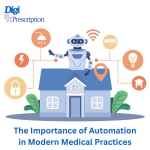
The Importance of Automation in Modern Medical Practices
In today’s fast-paced world, the healthcare sector is leveraging automation to transform medical practices. From streamlining administrative tasks to improving patient care, automation plays a pivotal role in making healthcare more efficient, accurate, and patient-focused. Here’s why automation is crucial for modern medical practices.
1. Enhancing Efficiency in Administrative Tasks
Administrative tasks such as appointment scheduling, patient record management, and billing consume significant time and resources. Automation simplifies these processes.
- Automated Appointment Scheduling:
Online systems allow patients to book appointments, reducing staff workload and minimizing scheduling conflicts. - Electronic Health Records (EHRs):
Automated updates and data retrieval save time and reduce errors.
2. Improving Patient Care and Outcomes
Automation allows healthcare providers to focus more on patient care by reducing manual workloads.
- Faster Diagnoses:
Automated diagnostic tools, like AI-powered imaging software, help doctors detect diseases quickly and accurately. - Real-Time Monitoring:
Devices like wearables provide automated updates on patient vitals, enabling timely interventions.
3. Reducing Human Errors
Errors in manual processes can lead to misdiagnoses, incorrect treatments, or financial discrepancies. Automation minimizes these risks.
- Prescription Automation:
Digital systems ensure accurate prescriptions, reducing the chances of medication errors. - Billing Accuracy:
Automated billing systems generate error-free invoices, enhancing financial transparency.
4. Streamlining Communication
Automation improves communication between doctors, patients, and staff, ensuring seamless information flow.
- Patient Portals:
Automated portals allow patients to view test results, treatment plans, and appointment schedules. - Inter-Department Communication:
Digital tools ensure that critical information is shared across departments in real time.
5. Cost Savings for Clinics and Hospitals
Automation reduces operational costs by optimizing resource utilization and minimizing wastage.
- Reduced Staffing Costs:
Automation handles repetitive tasks, allowing clinics to operate with smaller administrative teams. - Efficient Inventory Management:
Automated systems track inventory, preventing overstocking or shortages of medical supplies.
6. Enabling Scalable Growth
As patient demand increases, automation helps medical practices scale without compromising service quality.
- Flexible Scheduling Systems:
Automated tools accommodate more appointments efficiently. - Data-Driven Insights:
Analytics generated by automated systems aid in making informed business decisions.
Challenges in Implementing Automation
Despite its benefits, adopting automation comes with challenges such as high initial costs, training requirements, and resistance to change. However, the long-term gains in efficiency and patient satisfaction far outweigh these initial hurdles.
Conclusion
Automation is not just a luxury but a necessity for modern medical practices. By streamlining workflows, reducing errors, and enhancing patient care, it enables healthcare providers to operate more efficiently and deliver better outcomes. As technology continues to evolve, automation will play an even more significant role in shaping the future of healthcare.
